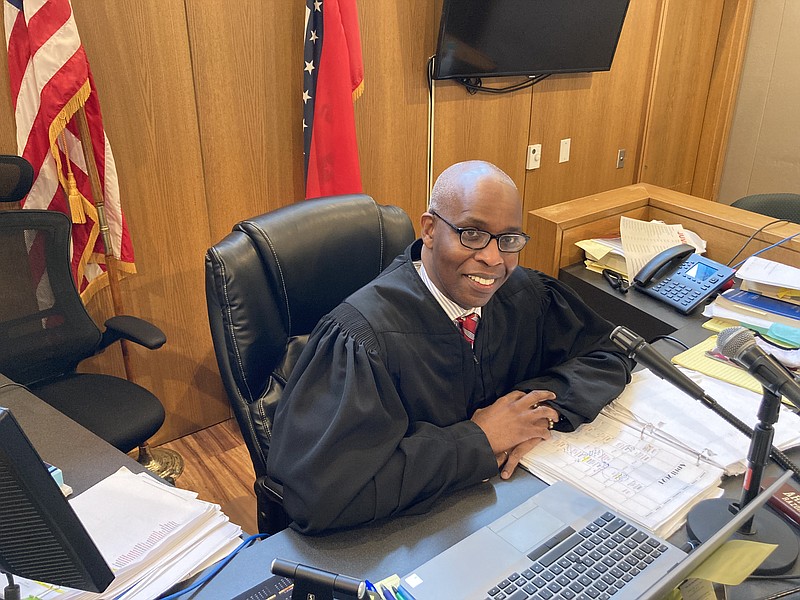Circuit Judge Earnest Brown Jr. has been working for seven years to bring a program to his jurisdiction to help families with young children, and it finally happened.
The judge, who handles juvenile court matters for Lincoln and Jefferson counties, was notified that his 6th Division will receive a share of a $425,000 grant made available from the Zero to Three National Resource Center of Infant-Toddler Court Program.
"This is huge," Brown said last week. "It's a big deal for us to have this here. I have a lot of families that need this once they get into the court system."
Pulaski County had the original program, but now three new counties have been added -- Benton, Sebastian and Jefferson -- and they will share the grant money. Arkansas is one of only three states in the nation to receive the grant.
With funding from the Health Resources and Services Administration's Maternal and Child Health Bureau, the NRC has the vision of improving outcomes for all child welfare-involved young children and families.
The goal is to dramatically reduce the number of babies and toddlers removed from their families, restore and strengthen family relationships and create positive futures for those who enter foster care. The grant is part of $3,050,000 in new program development grant awards to states and local communities across the country.
"We are excited about and grateful for this grant funding," said Keith Metz, DCFS spokesperson. "Safe Babies is an effective approach to improving outcomes for children and families, and we're thrilled to expand this approach into Jefferson and Lincoln counties. Results show that children are reaching permanency three times faster than infants and toddlers in the general foster care population. Almost two-thirds of those served by Safe Babies teams find permanent homes with members of their families while only one-third of infants and toddlers in the general population exit foster care to family members."
The money will allow Brown and his team to connect very young children -- those under age 3 -- and their families with additional support and services with the goal of advancing the health and well being of both.
Brown said he has been working on getting the program here for years and has been to conferences on both coasts as he lobbied to be included.
"I had no idea how big this program was seven years ago, but this is humongous," he said. "We're very excited for it. It's going to be a win, win win program to work with quite a few kids that come into this program."
When a child is removed from a home, the reasons have to do with some type of dependency neglect and may stem from drug abuse, the inability to find adequate housing or other problems. The program, which is voluntary on the part of the family and takes a commitment to try to improve the home situation, helps bring to bear various types of support and services that assist the family in making those improvements, Brown said.
A key element of that is visitation. Normally, after the Department of Human Services has removed a child from a home, DHS arranges weekly visits between the child and their parents at a DHS office. Brown said the Safe Baby program will allow his full-time coordinator, Shawani Milton, and others to increase those visitations to three or four times per week and have them at other sites, such as a restaurant, which enhances the visitation experience.
Without those visitations, Brown said, the bond between parent and child can sometimes erode to the point that it is nonexistent.
"You get used to being in an environment without a child and it does sometimes affect reunification," Brown said. "Time is of the essence. That connection with the parent and child is so very key, and the visitation is so important. The stronger we build that bond, the better that connection will be."
Brown is quick to point out that the program would not work without a lot of help from his supporting cast. In addition to his coordinator, there is Sherri Neikirk, executive director of Voices for Children, CASA; his ad litem attorneys, Chrishauna Easley and Dawanna Terry; the area DHS director, Annisa Ballew, who, Brown said, "has been with us every step of the way;" his parent counsels, Therese Free and Sharon Nichols, and numerous volunteers.
"This is going to provide so many more resources for our parents," Brown said. "You need all these people to come in and make it work. We don't have any issues with people not being on board. They have all stepped up. It's extra work, but it's good extra work. I couldn't do it without all of them."
Milton will be the person keeping her finger on the pulse of this project. She is paid by the Zero to Three program and gained much of her experience working for HIPPY, an educational enrichment program that helps families with young children.
"I am excited about the new program; I am," Milton said. "This will allow us to work with people in the community to find all the resources we have to make sure the families have access to those resources."
Milton said the main goal is "permanency," which is the situation in which children are being adequately cared for in their own homes.
"In keeping that as a focus, we can overcome many obstacles in supporting these families and keeping them out of the court system," she said. "We help create plans specific to each family's needs and then connect those families to resources in the community."
Milton said the first potential family came into the court system in early April, but she won't be able to start working with them as their case progresses.
